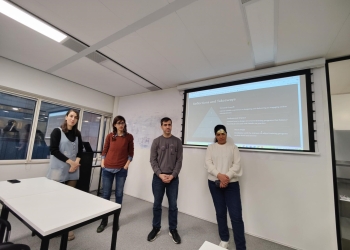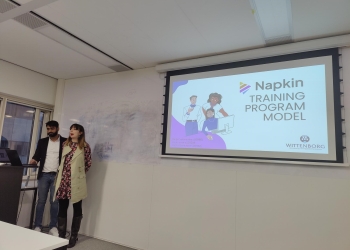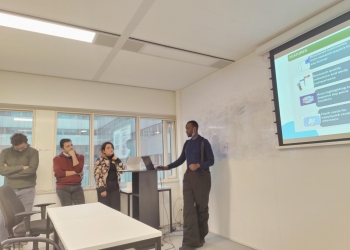Students Explore the Role of AI in Education for Amsterdam Project Week
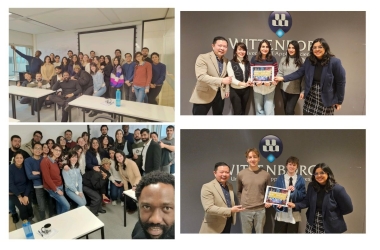
Master’s and Bachelor’s Students Choose AI Tools and Interview Professionals
Amsterdam's December Project Week brought together bachelor’s and master’s students for an exciting exploration of the impact of Artificial Intelligence (AI) on education. The event provided an opportunity for students to explore how AI tools can enhance learning experiences, streamline research methods, and revolutionise educational practices. It wasn’t just about theory — hands-on engagement and real-world applications were key elements, leading to insightful presentations and creative solutions.
Nikita Pahwa, Assistant Professor at Wittenborg, explained the core objective of the project to the master’s students: "The project presented a unique challenge to students, asking them to select an AI tool and train the bachelor’s students in using AI to support their learning. The primary goal was not just to familiarise students with these tools but to equip them with the knowledge to train others, all while maintaining a focus on quality education."
Students were divided into teams and assigned AI software such as Scholarcy, Prezi AI, Perplexity AI, Napkin AI, and Gamma AI to train bachelor’s students.
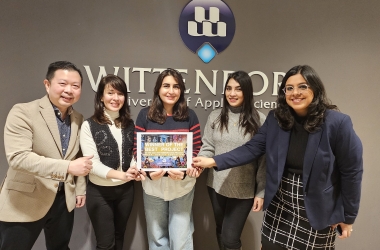
The winning group, consisting of Sara Etefagh, Roza Karimi, Rana Soltani, and Nhan Nguyen Hoang (Patrick), chose Lumen5. Lumen5 is a tool that enables users to create videos easily, a skill that is highly relevant in today’s digital age. "Lumen5 allows anyone to take a few key points and transform them into a full video with voiceovers—making it ideal for educational content. It has an excellent library of music and content, so it generates everything you need," Etefagh explained.
The group was first introduced to Lumen5 in a marketing class. "Nowadays, videos are so important. You can impress everyone and communicate your message within seconds," she added.
Karimi, on the other hand, mentioned that Project Week was very enjoyable as it required them to not only use AI but also master it since they were tasked with teaching it to other students.
"We’d never taught before, so we had to go through the process of learning how to teach, while also finding the best ways to present the material within a limited time. It was a challenge, but it was also enjoyable," she said.
She also credited their success to strong teamwork. "Everyone contributed something, and it turned out to be a great team effort. We truly enjoyed every moment of it."
Soltani spoke about the feedback from bachelor’s students: "The majority of the feedback was positive. The students found the session easy to follow, and many said they could immediately apply the skills to their own projects. However, they suggested we could have made the session more practical by including more hands-on exercises."
Reflecting on what she learned, Soltani noted: "Collaboration was key — learning how to cooperate and share responsibility. The second important lesson was teaching others. Training requires patience and a thoughtful approach. It’s a reminder that you learn more by teaching, as you tailor the material to different individuals. I also learned a great deal about AI. It’s used daily, but its potential is vast, and we have to keep up."
Pahwa was very impressed with the students' creativity: "The success of the project week was evident when I saw my students transform into trainers, applying design thinking principles and curating training sessions on these software tools from scratch. Witnessing their success brought me immense pleasure as a lecturer!"
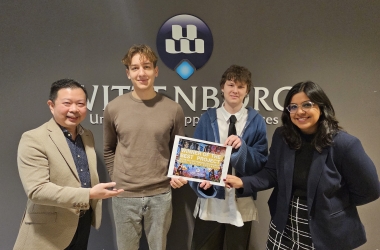
Similarly, bachelor’s students were tasked with interviewing professionals about the use of AI in personal and professional development and providing their findings as part of the project week. The winning bachelor’s group, comprising Aliaksandr Karol, Xiaoying Wei, Savva Morozov, Arsenii Vinnitskii, and Michael Olufade, were evaluated on the Quality of Interview Questions, Analysis and Findings, Key Takeaways and Reflective Learning.
According to Dadi Chen, Deputy Head of School of Business, the group won the prize due to their exceptional teamwork, insightful research design and findings, and excellent data visualisation and presentation skills.
The bachelor’s group interviewed professionals from various industries to understand how AI tools are being used in everyday tasks. They surveyed five interviewees, including an HR Assistant, an Entrepreneur, Study Location & CRM Manager, Business Development Manager, and Head of Interns. The professionals highlighted several ways AI is being applied across different sectors, such as text generation, search engines, analysis, brainstorming, and learning. AI was particularly noted for its ability to save time, provide data-driven insights, automate repetitive tasks, and assist in advanced learning. However, there were also concerns regarding AI’s limitations, including privacy issues, lack of transparency, and accuracy problems.
The interviewees also discussed both the positive and negative impacts of AI. On the positive side, AI helps with cost-cutting through process automation, content generation, and real-time recommendations for decision-making. On the negative side, concerns included the decline in human interaction, over-reliance on AI, and the potential loss of entry-level jobs.
Vinnitskii said that they spent around three weeks carefully developing the interview protocol to incorporate all aspects needed for their research. "Various tools and methodologies were used to both understand and implement the required background for our study.
"After completing this research, the time came to plan the interviews, and this is where our team's flexibility proved beneficial. We were able to create a schedule of interviews where each member was able to contribute, allowing us to include as many interview participants as possible within a limited time frame.
"Even though a lot of time went into interview design, it is impossible to account for everything, so our agility was useful at that stage as well. What has also helped is the shared understanding of our research end goals."
WUP 19/02/2025
by Erene Roux
©WUAS Press
